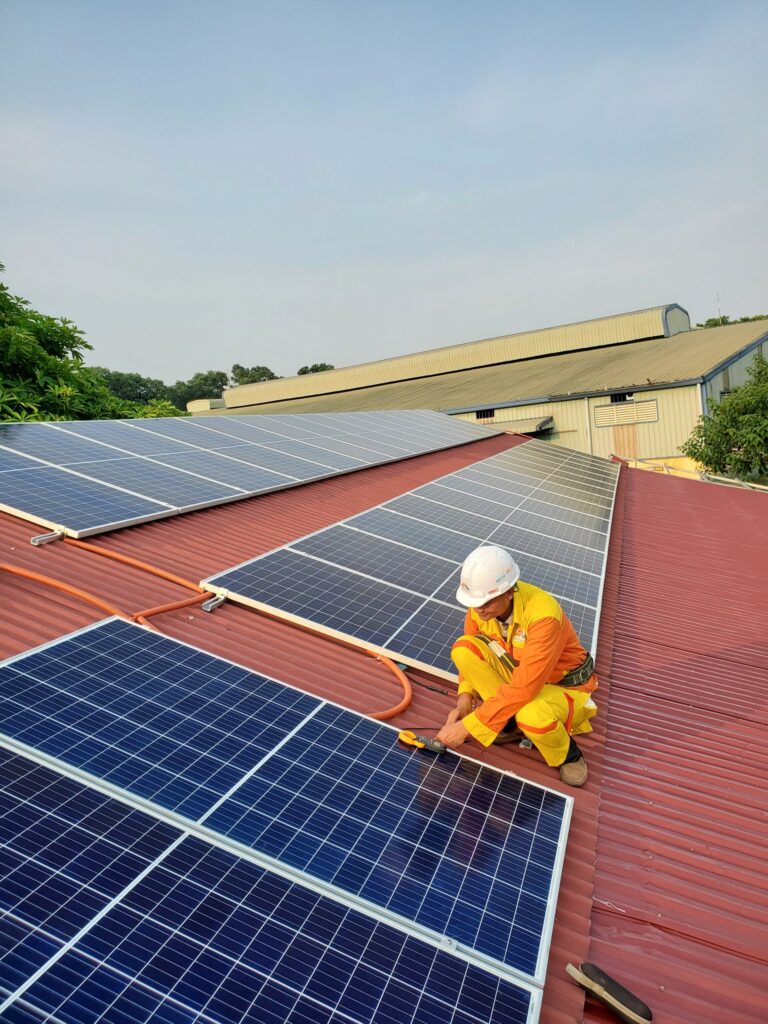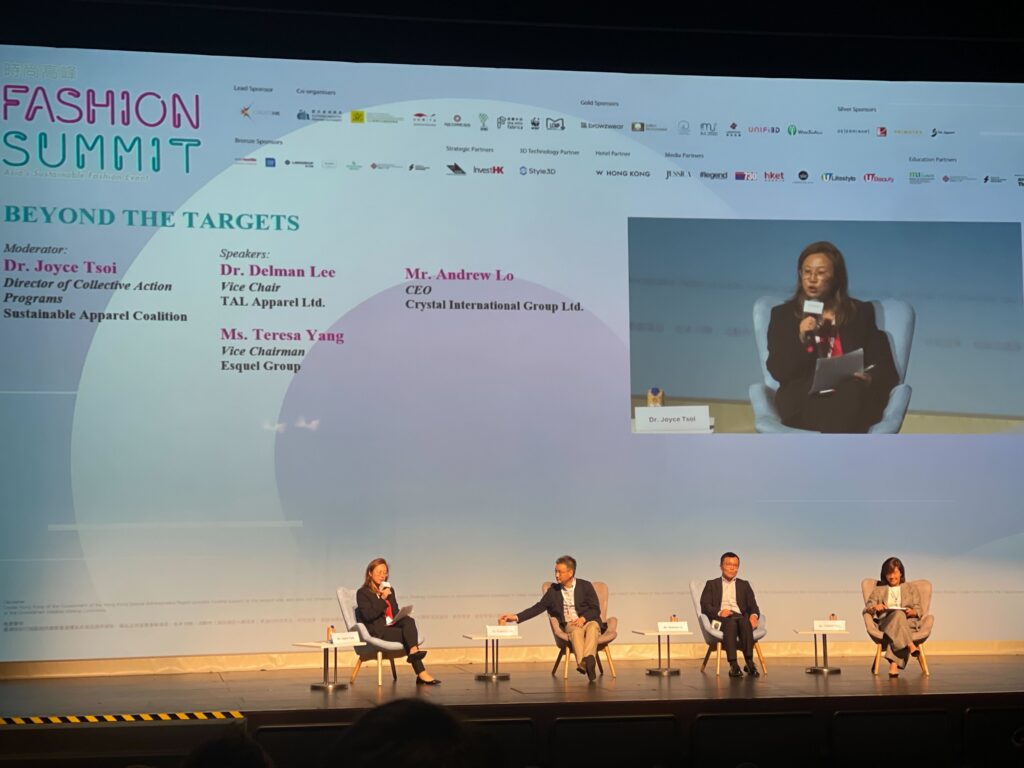
Dear Fashion: Let’s Step Up and Get Aligned
In a recent opinion editorial with WWD, CEO Colin Browne argues fashion needs to take more serious and coordinated action on sustainability. Read the highlights here!


In the world of physics, few names carry as much weight as Peter Higgs.
Yet, it’s in the realm of sustainability where his legacy finds a surprising homage. Higgs, who died Tuesday at age 94 in Edinburgh, Scotland, received the Nobel prize for physics in 2013 for his work on the boson particle.
The Higgs boson particle would forever shape humanity’s understanding of atoms – and at Cascale, it served as inspiration for the Higg Index tools. Today, these tools are used by 24,000 businesses worldwide, empowering collaboration to drive equitable and restorative business practices in the consumer goods industry.
At Cascale’s recent rebrand celebratory event in London, co-founder Rick Ridgeway shared the story of how Higgs’ breakthrough announcement impacted the organization’s earliest days. “They had just discovered a subatomic particle [that] was going to unify the universe, Ridgeway said. “They were going to announce it about the same time we wanted to release our tool…I said, ‘If the Higgs boson atomic particle is going to unify the universe, the Higg assessment tool is going to save it.’”
Much of Higgs’ lifetime of work took place at Edinburgh University, and, in 2012, the institution set up the Higgs Centre for Theoretical Physics in his honor – the same year his theory was accepted and proven by scientists at The Large Hadron Collider at Cern in Switzerland. Decades of collaboration also went into the discovery: Higgs shared the Nobel prize with Belgian theoretical physicist François Englert, whose work directly contributed to the particle’s discovery.
Higgs’ legacy continues to inspire, as use of the Higg Index tools expands across the consumer goods industry, accelerating adoption of science-aligned targets through the Decarbonization, Manufacturer Climate Action Programs (MCAP), and other impact programs. This example is just one of the many synergies between industry and science in pursuit of a better planet.

Joyce Tsoi, SAC director of Collective Action, co-hosted an in-person and virtual meetings in Vietnam and Cambodia to kick off the SAC x Project Development Programme (PDP), which aims to develop and scale rooftop solar photovoltaic project(s) to manufacturing facilities in Vietnam and Cambodia. Implemented by Deutsche Gesellschaft für Internationale Zusammenarbeit (GIZ) GmbH, the Project Development Programme (PDP) is an integral part of the German Energy Solutions Initiative. Coordinated and financed by the German Federal Ministry for Economic Affairs and Climate Action (BMWK) it aims to globalise German and European technologies and expertise in climate-friendly energy solutions. The PDP combines development cooperation with private-sector engagement to foster partnerships between local businesses and trusted providers of climate-friendly energy solutions, creating mutually beneficial outcomes and advancing the energy transition in its cooperation countries. Simultaneously, German and European providers benefit by easing their market entry into developing and emerging countries.
In Vietnam, the meeting also included a presentation from Eunice Doan, energy advisor and Country Representative of PDP Vietnam, and Lucia Hoang, regional manager of CSR Southeast Asia for Bureau Veritas, a world leader in laboratory testing, inspection, and assessment services. In Cambodia, presenters included Vabotra Chea, Technical Advisor and Country Representative of PDP Cambodia, and Rijan Shrestha, Technical Advisor and Country Manager of PDP Cambodia.
At both meetings, Tsoi shared information about the SAC’s Collective Action team, which oversees the development of its Decarbonization Program in support of the organization’s goals to achieve a 45 percent greenhouse gas (GHG) emission reduction in line with science-based targets (SBTs) by 2030 — and to zero by 2050. The SAC launched the Decarbonization Program in 2022 and integrated SBTs into SAC’s membership requirements in 2023, with over 50 percent of members having taken this action to date. “We believe that this is the most credible and ambitious approach, backed by the latest climate science,” Tsoi said. “SBTs have become fundamental expectations for companies globally in multiple industries and we want to enable our industry towards a low carbon transition by shifting from heavily fossil fuels use to adopting renewables or low carbon sources.
To achieve these goals, the SAC partnered with Textile Exchange and Zero Discharge of Hazardous Chemicals (ZDHC) to form the Apparel Impact Institute (Aii), creating a connected, end-to-end path to action for the entire apparel and footwear industry. The Collective Action team is committed to activate the SAC’s ecosystem for action and announced the launch of the Manufacturer Climate Action Program (MCAP) in September of this year. Designed in collaboration with NIKE and Target Corporation, the MCAP is a critical component of the SAC’s Decarbonization Program efforts to catalyze support and drive the sector toward ambitious yet necessary CO2 emissions reductions. Tsoi also shared the four key elements that form the core of MCAP, empowering manufacturers to define their scope 1 and 2 science-aligned targets, immediately take critical action to reduce their direct and indirect emissions and improve operational efficiency in order to advance industry goals.
During the Vietnam meeting, Tsoi used data accessed through the SAC’s Higg Facility Environmental Module tool in order to break down the mix of energy sources at manufacturing sites both globally and in Vietnam; the use case illuminated the sector’s dependence on fossil fuels. Over 80% of energy usage in 1253 facilities in Vietnam are from fossil fuels. Only 12.4% of energy comes from renewable energy sources. She also shared data on renewable energy adoption around the globe and was able to show Vietnam is a progressive country to increase its renewable energy capacity to sustain the growth of its industries. Following Tsoi’s presentation, Hoang shared the service offerings of Bureau Veritas Vietnam, which can support manufacturers in conducting life cycle assessments (LCAs), performing energy diagnosis services and consulting for GHG calculation and setting SBTs. Doan then explained the support and services offered to facilities by PDP, which guides facilities through the development process of solar PV technology and the selection of system size; service provider, equipment, and best investment scenario. These include technical evaluation, investment appraisal development, solar power implementation, and introduction to financing opportunities with preferential loan interest rates.
At the Cambodia meeting, Vabotra explained that with an average daily solar radiation of 5 kWh/m2 and average sunshine of 8 hours per day, Cambodia is one of the Southeast Asia countries that has high solar potential. He also discussed the regulatory landscape in terms of the history of Cambodia’s solar development, options to deploy renewables based on the Ministry of Mines and Energy (MME)’s updated principles of permitting the use of rooftop solar power. Rijan followed with an explanation of how the PDP team can support manufacturers in technical evaluation, investment proposals, and project implementation.

SAC executives Jeremy Lardeau, Vice President Higg Index, and Joyce Tsoi, Director, Collective Action Programs, APAC, presented at Fashion Summit (HK), the sustainable fashion event funded by Create Hong Kong and organized by the Clothing Industry Training Authority (CITA), in support of the 2024 theme: “Actions to the Sustainability Journey.” After opening speeches from Richard Cheng, Chairman of Fashion Summit (HK) 2023, Kevin Yeung Yun-hung, GBS, JP Secretary for Culture, Sports and Tourism, HKSAR Government, Hon. Sunny Tan, Member of the HKSAR Legislative Council (Textiles & Garment), and Yang Xiaodong, Vice President of the China Garment Association, Jeremy Lardeau, Vice President Higg Index, offered a keynote presentation on sustainability analytics in the apparel industry.
Lardeau initially shared background information about the SAC, the global multi-stakeholder nonprofit alliance that represents a diverse global membership of over 280 members – about 50% of the apparel and textile industry – in 36 countries. Lardeau explained that over the past two years, the organization has seen the greatest amount of growth, demonstrating the collaborative momentum of the industry coming together to address systemic challenges and co-develop solutions with an approach based in equal partnership.
Lardeau explored how the SAC’s work is anchored by the Higg Index, a suite of tools that measures social and environmental impact through five core tools based in three key categories: two Higg Product Tools and three Higg Facility Tools. “Developed in collaboration with our members, and employed throughout the decade as working tools achieving measurable sustainability goals, the Higg Index stands today as the leading example of end-to-end sustainability measurement index, for any industry,” Lardeau said. “These tools have matured into comprehensive, robust offerings ready to scale and form a template for our industry’s pursuit of impact improvements. Nonetheless, they will continue to evolve, as science improves and our understanding of the industry’s challenges deepen, allowing us to support our members and the industry.”
He then shared examples of how the tools serve the industry:
Finally, Lardeau closed with a challenge: “How do we finance, enable and execute these interventions, in a way that is fair and equitable across the value chain partners?” Building on this idea, Joyce Tsoi, SAC’s Director, Collective Action Programs, APAC, moderated a panel hosted by the Clothing Industry Training Authority that featured Delman Lee, Vice Chair of TAL Apparel Ltd. and SAC Immediate Past Board Chair, Andrew Lo, CEO of Crystal International Group Ltd., and Teresa Yang, Vice Chairman of Esquel Group.
As initial framing, Tsoi shared that companies around the globe are making bold commitments to combat climate change: A recent Science Based Target Initiative (SBTi) report shows the highest number of companies set targets on record in 2022 alone than the entire seven years prior. And although an annual 4.2% emissions reduction is required for a 1.5ºC alignment for science-based targets, it was found that a typical SBTi-approved company has set even more ambitious goals, with a linear rate of 8.8% scope 1+2 reductions per year. In order to achieve these goals, Tsoi shared, companies will need to secure full organizational support for the company’s decarbonization priorities to achieve a just and equitable low carbon transition.
As all three panelists represent companies that have committed to long-term net zero goals by 2050, Tsoi asked questions that allowed them to share the pillars of their climate action programs, how they are incentivizing and empowering staff at all levels to take climate action, and how they are building collaborative ecosystems across organizations, sectors, and value chains to achieve a just and equitable low-carbon transition.